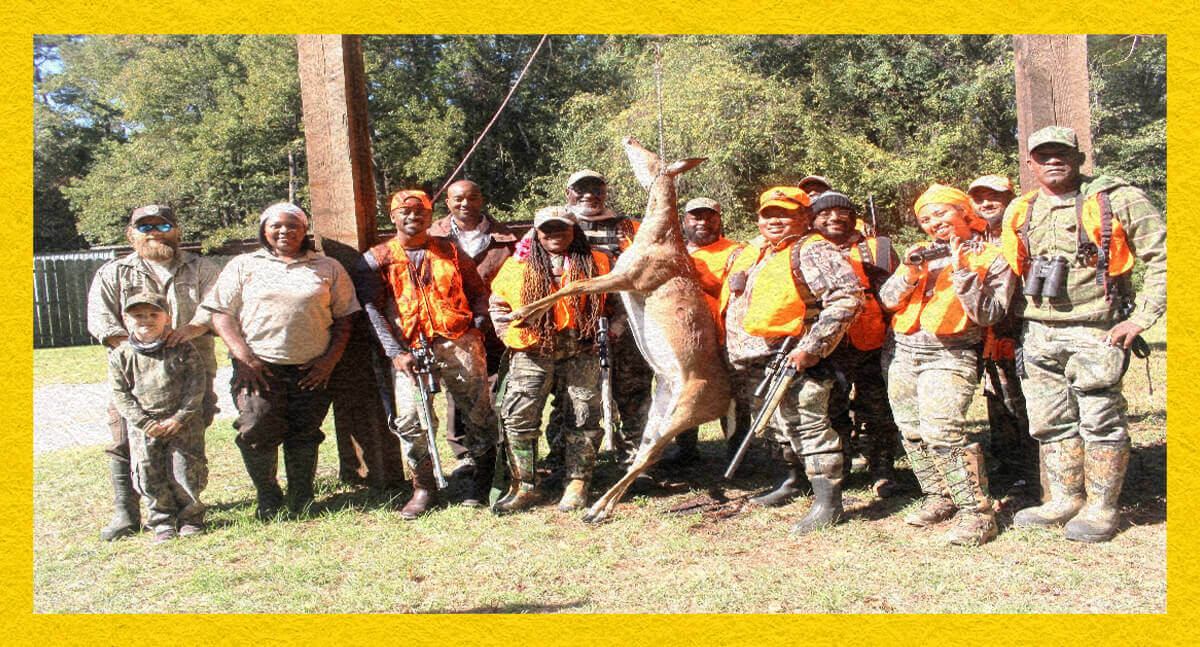Walking the Walk towards Diversity

Eric Morris (Right front) with a group of minority hunters he introduced to public land hunting opportunities.
For the nearly 15 million hunters across the United States, Fall traditionally symbolizes the start of hunting season, but for many minorities, hunting is seen as an unfamiliar and out of reach activity due to limited exposure and not knowing how or where to get started. Sometimes hunting can also be seen as unwelcoming, since people of color are seldom shown in the outdoors. Contrary to what many have been led to believe, people from minority communities do have a strong interest in hunting. I have found this to be true time and time again as I have filled hunt after successful hunt with minorities; many who have never hunted before. The problem, however, is that ongoing recruitment and marketing efforts by the hunting and outdoor industries are producing less than desired results.
Since 2010, I have been introducing hundreds of minorities across America to the sport of hunting. I am known within the hunting and conservation community as the person who can produce results when others cannot. Through a combination of recruiting at the grass roots level, conducting private group hunts, and through strategic planning with State and Federal agencies such as Texas Parks & Wildlife, U.S. Corps of Engineers, and the U.S. Fish and Wildlife Service, I consistently introduce 30-40 minorities to hunting each year via an actual hunt, and hundreds more via social media platforms. I created N.onT.ypical Outdoorsman TV, a diverse and entertaining outdoor show, to directly address the lack of racially diverse outdoor television shows, and to inspire more minorities to become hunters and outdoorsmen. Airing on Pursuit Channel in 2019 and 2020, the show averaged a monthly viewership of 225,000 households across the nation. The show will return for a third season in January as a paid subscription streaming channel to allow even more people to see the outdoor diversity that America so desperately needs.
Along my journey to what would become a most unusual and fulfilling profession, many have asked, “How did I come to do what I do”? or, “Why do I do it”? The answer is simple: I do what I do because it is necessary, and well past time for someone to have done it. After a lifetime of not seeing anyone who looked like me in mainstream hunting media or on television, I decided to create the change that I wanted to see. The response has been overwhelming, as many minorities are thrilled to finally see someone that looks like them thriving in an area where we have traditionally been omitted. However, success did not come without setbacks. Nevertheless, I continued to walk the walk and adhere to the belief that “actions speak louder than words.” Today, I have garnered respect from the outdoor industry and have gained a large and diverse fan base. Progress never comes easy, especially when it involves changing the perception, image, and attitude towards what a hunter should look like in America; but the deer hunts, pheasant hunts, hog hunts, quail hunts, filming and airing these adventures, and endless outreach efforts to inspire others to become hunters, makes it all worthwhile.
Many would say that I am lucky to be able to hunt and travel the country for a living, and I agree, but the greatest joy of all is being able to influence and mentor others to pursue the hunting lifestyle. However, if we are going to create the outdoor diversity that we want to see, more of us need to be willing to walk the walk, instead of just talking the talk. More should commit to becoming ambassadors of outdoor diversity and to making hunting and the outdoors a more welcoming place. After all, there is no shortage of minorities waiting to be introduced to hunting and the outdoors. Keep hunting!
Eric Morris is the Producer and Host of N.onT.ypical Outdoorsman TV and Founder of N.onT.ypical Outdoorsman, an organization that takes a direct approach to creating more diversity and inclusion among America’s hunters. He is a Hunter Education Instructor and is a leader in recruiting minority hunters from across the nation. When he is not producing episodes, or hosting hunts, Eric can be found consulting conservation agencies on how to increase minority participation in hunting and outdoor events.
